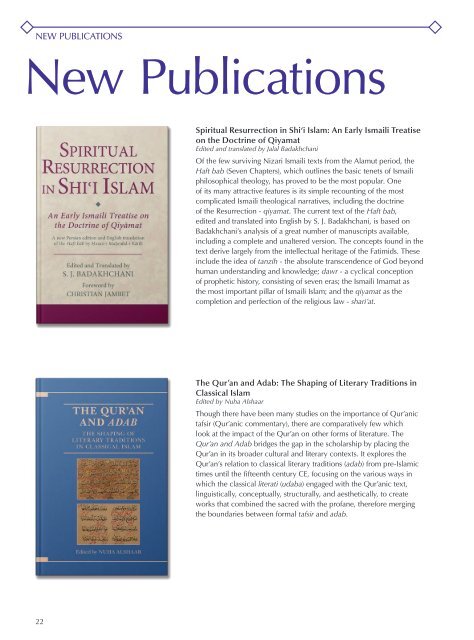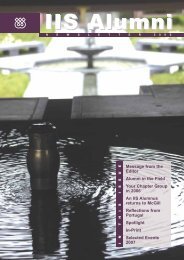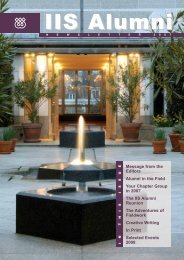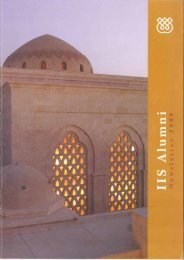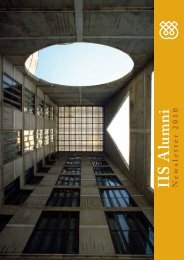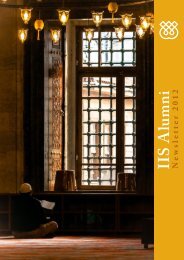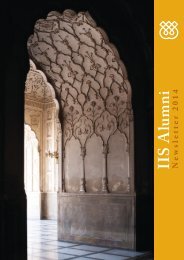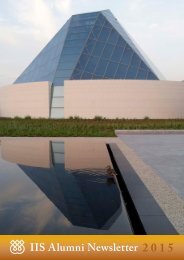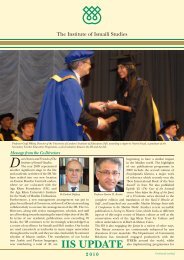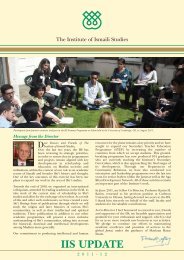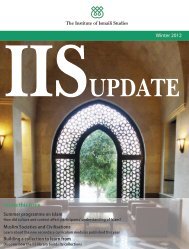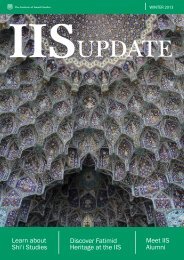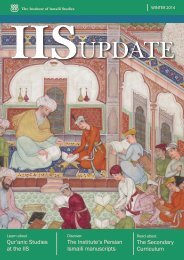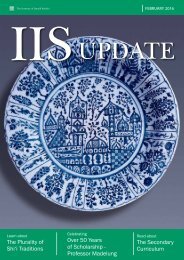IIS Update - Edition 17
IIS Update - Edition 17 The Institute has been publishing an annual IIS Update since 2000, to inform its supporters, affiliates and well-wishers of its programmes and activities. The IIS Update includes information about the Institute’s recent and forthcoming projects, as well as news about its publications and staff.
IIS Update - Edition 17
The Institute has been publishing an annual IIS Update since 2000, to inform its supporters, affiliates and well-wishers of its programmes and activities. The IIS Update includes information about the Institute’s recent and forthcoming projects, as well as news about its publications and staff.
Create successful ePaper yourself
Turn your PDF publications into a flip-book with our unique Google optimized e-Paper software.
NEW PUBLICATIONS<br />
New Publications<br />
Spiritual Resurrection in Shi‘i Islam: An Early Ismaili Treatise<br />
on the Doctrine of Qiyamat<br />
Edited and translated by Jalal Badakhchani<br />
Of the few surviving Nizari Ismaili texts from the Alamut period, the<br />
Haft bab (Seven Chapters), which outlines the basic tenets of Ismaili<br />
philosophical theology, has proved to be the most popular. One<br />
of its many attractive features is its simple recounting of the most<br />
complicated Ismaili theological narratives, including the doctrine<br />
of the Resurrection - qiyamat. The current text of the Haft bab,<br />
edited and translated into English by S. J. Badakhchani, is based on<br />
Badakhchani’s analysis of a great number of manuscripts available,<br />
including a complete and unaltered version. The concepts found in the<br />
text derive largely from the intellectual heritage of the Fatimids. These<br />
include the idea of tanzih - the absolute transcendence of God beyond<br />
human understanding and knowledge; dawr - a cyclical conception<br />
of prophetic history, consisting of seven eras; the Ismaili Imamat as<br />
the most important pillar of Ismaili Islam; and the qiyamat as the<br />
completion and perfection of the religious law - shari’at.<br />
The Qur’an and Adab: The Shaping of Literary Traditions in<br />
Classical Islam<br />
Edited by Nuha Alshaar<br />
Though there have been many studies on the importance of Qur’anic<br />
tafsir (Qur’anic commentary), there are comparatively few which<br />
look at the impact of the Qur’an on other forms of literature. The<br />
Qur’an and Adab bridges the gap in the scholarship by placing the<br />
Qur’an in its broader cultural and literary contexts. It explores the<br />
Qur’an’s relation to classical literary traditions (adab) from pre-Islamic<br />
times until the fifteenth century CE, focusing on the various ways in<br />
which the classical literati (udaba) engaged with the Qur’anic text,<br />
linguistically, conceptually, structurally, and aesthetically, to create<br />
works that combined the sacred with the profane, therefore merging<br />
the boundaries between formal tafsir and adab.<br />
22


